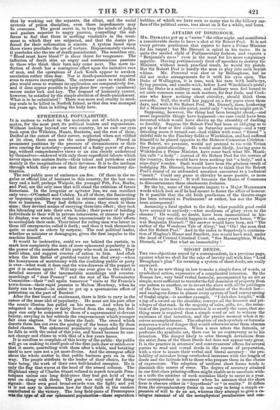EPHEMERAL POPULARITIES.
Ix is curious to reflect on the materials out of which a people makes, for the most part, its political leaders and regenerators. Without looking beyond our own country, let us cast our eyes back upon the Wilkeses, Hunts, Burdetts, and the rest of them. Deified at the outset of their career, neglected when not vilified at its close, these men are the same throughout. Placed in prominent positions by the pressure of circumstances or their own craving for notoriety—possessed of a flashy power of pleas- ing, without comprehensive views or an aim clearly understood by themselves—endowed with only those superficial talents which never ripen into mature fruits—their talent and patriotism exist mainly in the imaginations of their devotees. It is to the medium through which they are seen that they owe their transitory dis- tinction.
The real public men of eminence are few. Of those in the re- gular or official line of business in this country, for the last cen- tury and a half, perhaps Walpole, the younger Pitt, Fox, Burke, and Peel, are the only ones that will stand the criticism of future historians. In the irregular or agitator line, we can recollect .only two—O'Connell and Cobden. In all of these, the fascinating or imposing qualities were rooted in intense continuous applica- tion to business. They had definite aims; they stuck to these aims ; they devised means of carrying them-into effect ; they took the labouring oar into their own hands ; their power of bending individuals to their will in private intercourse, or masses by pub- lic display, was struck out of them unconsciously in their efforts to accomplish their ends. Their talent for ruling men was latent in them till emergencies called it forth; and then it took themselves quite as much as others by surprise. The real political leader, whether as minister or demagogue, gives the first impulse to the machine himself.
It would be instructive, could we see behind the curtain, to mark how completely the man of mere ephemeral popularity is in the power of the members of his party who work in secret. They instil ideas' and suggest courses of action to him. And often when the first flutter of gratified vanity has died away—when the honeymoon of matrimony with the confiding public or party is over—what work it does cost the wire-drawers of the puppet to get it in motion again 1 Will any one ever give to the world a detailed account of the innumerable marchings and counter- marchings of "dear Pouncy" and the rest of the Westminster Committee—their "call again tomorrow "visits at Sir Francis's town-house—their rapid journies to Melton Mowbray, when he fairly ran to kennel—in order to get up a spontaneous effort of patriotism on the part of Burdett? After the first burst of excitement, there is little to envy in the career of the mere idol of popularity-. He must act his part after the scenic illusion has palled on his sense. And when he is relegated to obscurity, or fairly hooted from the stage, his feel- ings can only be compared to those of a superanuated ci-devant beauty, envying in her solitude the empressement which younger fair ones engross. Nor is theirs the fault. The crowd which deserts them has not even the apology of the beaux who fly from faded charms. The ephemeral popularity is applauded because he falls in with the mood of this year, and hissed because he can- not change and chime in with that of a few years hence.
It is needless to complain of this levity of the public : the public will go on making to itself gods of the first jack-daw or much-cow that it meets, quarrelling with them after a while, and betaking itself to new ones not a jot more divine. And the strangest affair about the whole matter is, that public business gets on in this way. The people attribute to the leader of their choice, for the time being, the work of their own bull-headed energies. He is only the flag that waves at the head of the armed column. The Highland army of Charles Stuart refused to march towards Pres- tonpans unless one long field-piece they had got hold of was aent on along with them. The gun was only used for firing signals : their own good broad-swords won the fight; and yet it is not easy to determine how far their faith in the cannon contributed to the victory. The long field-piece of Prestonpans Wu the type of all our ephemeral popularities—those reputation bubbles, of which we have seen so many rise to the billowy sur- face of the political ocean, toss about on it for a while, and burst.


















































 Previous page
Previous page